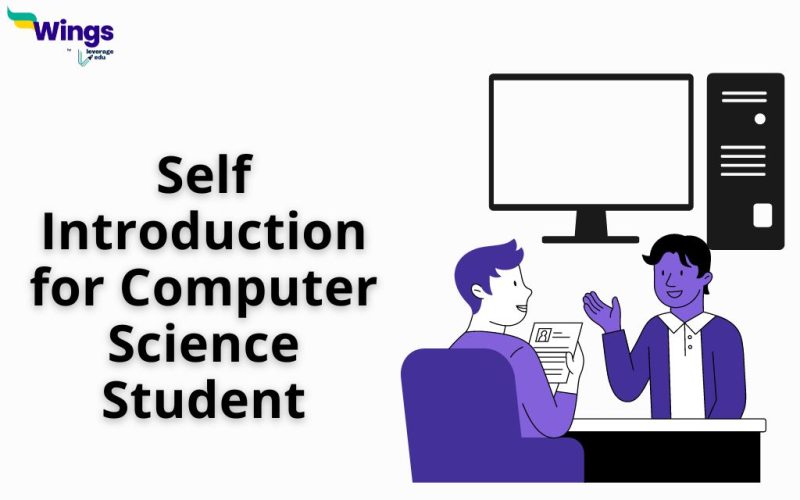Self-introduction is introducing oneself to another person or a group of people. It is a brief description of who you are, what you do, your background, your interests, and your aspirations.
A self-introduction can be verbal or written, and it is often used in professional and social settings when meeting new people or starting a conversation. A self-introduction aims to give others a quick overview of your identity and establish a connection with them.
Self Introduction for a Student
A self-introduction for a college student typically includes information about their educational background, interests, and goals. Here are some key elements that a college student may want to include in their self-introduction:
- Name and major: Start by introducing yourself and sharing your name and your major. This gives the listener a quick idea of your academic interests.
- Educational background: If you transferred from another college or university, or if you have any other relevant educational experiences, you may want to mention them briefly.
- Interests and hobbies: Share some information about your interests and hobbies, especially those that relate to your academic or career goals.
- Career goals: Share your career goals and aspirations. This can help others understand what you hope to achieve through your education and what kind of work you hope to do in the future.
- Personal strengths: Consider highlighting some of your personal strengths that may be relevant to your academic and career goals. For example, if you’re particularly good at public speaking, you could mention that as a skill that you hope to develop further.
Must Read: How to Ace an Online Interview?
Tips to Remember While Giving Self Introduction
If you’re a computer science student, here are some tips for giving a self-introduction:
- Start with your name and major: Begin by introducing yourself and sharing your name and your major. For example, “Hi, my name is [Name], and I’m a computer science major.”
- Mention your programming experience: Share any programming languages or technologies you have experience with. For example, “I have experience with Java, Python, and SQL.”
- Share your academic interests: Talk about your academic interests within computer science. This can help others understand what you’re passionate about and what kind of work you’re hoping to do in the future. For example, “I’m particularly interested in artificial intelligence and machine learning.”
- Talk about relevant projects: If you’ve worked on any programming projects, share some information about them. For example, “Last semester, I worked on a team project that involved developing a mobile app for tracking fitness goals.”
- Mention your career goals: Share your career goals and aspirations, and talk about how your computer science education is helping you work towards those goals. For example, “I hope to work as a software engineer at a tech company after graduation.”
Remember to keep your self-introduction brief and focused, and try to make it engaging and memorable. By sharing your background and interests, you can help others understand what you bring to the table as a computer science student.
Must Read: Handle Tough Interview Questions With Ease
Self Introduction for Computer Science Student- Sample
Here’s an example self-introduction for a computer science student:
“Hello, my name is Saanvi, and I’m a computer science major. I have experience with several programming languages, including Java, Python, and SQL. I’m particularly interested in artificial intelligence and machine learning, and I’m currently working on a project that involves developing an AI-powered chatbot.
Last semester, I worked on a team project that involved developing a mobile app for tracking fitness goals. I learned a lot about software development processes and project management during that experience.
After graduation, I hope to work as a software engineer at a tech company, where I can continue to develop my skills and contribute to innovative projects. In my free time, I enjoy attending hackathons and learning about new technologies in the field.
For more such latest blogs on interview preparation, careers and more, stay tuned with us. And don’t forget to follow us on Instagram, Facebook, Twitter, and Linkedin.
 One app for all your study abroad needs
One app for all your study abroad needs














 45,000+ students realised their study abroad dream with us. Take the first step today.
45,000+ students realised their study abroad dream with us. Take the first step today.

